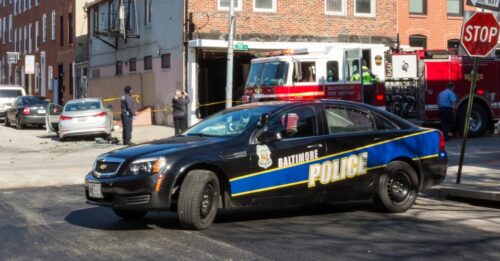
2.3.23 – Government Technology
Lawmakers from both parties are supporting a bill that would help law enforcement agencies in the state afford body cameras and the necessary storage technology. Smaller agencies have struggled with these costs.
Legislation to help local law enforcement agencies afford body cameras and storage for thousands of hours of footage has bipartisan support in Maryland’s legislature.
Under a law passed during the 2021 General Assembly session, police agencies in Maryland are required to have on-duty officers wear cameras by July 1, 2025. But smaller agencies have struggled to come up with funding to buy cameras and store digital files.
“The only question has been how to implement it properly — which we had to do in the law — and then how to pay for it,” Senate Minority Whip Justin Ready explained.
The bill — sponsored Ready, a Republican from Carroll County, and House Majority Whip Jazz Lewis — would require the state’s departments of general services and of information technology negotiate affordable contracts for police departments with smaller budgets.
Lewis said the cost of body cameras depends on their level of technology. More expensive types automatically turn on when an officer pulls a gun from a holster and have video recall functions. Cheaper ones need to be turned on manually.
The Carroll County Board of Commissioners last summer approved a $1.4 million contract for the sheriff’s office to procure body and in-car cameras, video storage, hardware, software, licensing, training, installation and related equipment.
The legislation would also require the Maryland Police Training and Standards Commission, which regulates best practices for law enforcement agencies in the state, to conduct a study to determine how best to store footage — a costly endeavor.
The House Judiciary Committee will hold a hearing next week on the bill. The Senate version will be heard Feb. 14.
Lewis, a Democrat from Prince George’s County, and Ready sat on a legislative Law Enforcement Body Camera Task Force to come up with funding recommendations for police departments.
Ready, a representative of Carroll County, said Republicans have supported body cameras for all law enforcement officers — even during the 2021 legislative session, when they argued that sweeping police reform measures passed following the police killing of George Floyd in Minneapolis went too far.
He also said that “any law enforcement” officer he’s talked to “in all the last several years of all this debate” has said they want body cameras.
“The debate has been over the entire tenor of ‘All police … start out inherently bad,’ which I don’t agree with, and I think body cameras help us prove what a great job police do, generally,” Ready said.
Lewis called body cameras “a transparency tool” that can exonerate “good actors” in law enforcement, as well as an “accountability tool” for officers who use unnecessary force.
Discussions of the bill took on greater relevance following last week’s release of body camera footage depicting the fatal beating Jan. 7 of 29-year-old Tyre Nichols in Memphis, Tennessee.
However, Maryland isn’t immune from fatal injuries suffered in police custody, notably that of Freddie Gray after he was hurt in a Baltimore police van in 2015; Anton Black, who police pinned to the ground in 2018 outside his mother’s Eastern Shore home, and William Green, who officers shot while he was handcuffed in a Prince George’s County Police car in 2020.
Though the bill to aid local police departments was introduced Jan. 25 in the House, before Memphis police released its footage of Nichols, Lewis said it’s “very timely and it shows that the work is not yet finished and it’s why we need to lower the price” of body cameras.
“The murder of Tyre Nichols is a tragedy and there’s too many stories like that,” he said. “The only bright light is the fact that we know about it because it was recorded and then accountability can come forward.”
©2023 Baltimore Sun, Distributed by Tribune Content Agency, LLC.
